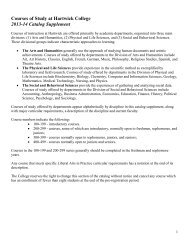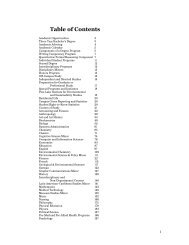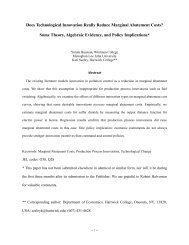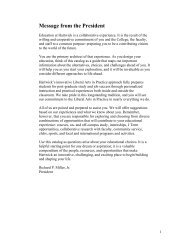Table of Contents - Hartwick College
Table of Contents - Hartwick College
Table of Contents - Hartwick College
You also want an ePaper? Increase the reach of your titles
YUMPU automatically turns print PDFs into web optimized ePapers that Google loves.
Chemistry majors have a wide range <strong>of</strong> career options available to them.<br />
Bachelor <strong>of</strong> science majors may opt directly for careers in industry in<br />
areas such as chemical analysis, pollution control, research and<br />
development in manufacturing, and product quality control. They also<br />
may pursue advanced study in chemistry, which can lead to a wide range<br />
<strong>of</strong> careers in research, college teaching or industrial management.<br />
Majors with a bachelor <strong>of</strong> arts may choose such careers as environmental<br />
analysis, industrial sales, business administration, geochemistry,<br />
secondary school teaching, art conservation and political consulting.<br />
Alternately, one may pursue pr<strong>of</strong>essional studies in optometry, dentistry,<br />
medicine, engineering and law.<br />
Faculty<br />
Chemistry Faculty: Meredith E. Newman, chair; Richard L. Benner;<br />
Mark S. Erickson; Walter O. Nagel; John Dudek; Susan M. Young<br />
Courses<br />
100 Chemistry, Science, and Life (4 credits) (lecture and laboratory)<br />
An introduction to the language and principles <strong>of</strong> chemistry emphasizing<br />
its practical aspects. Along with covering basic chemistry, the focus <strong>of</strong> the<br />
course will range from environmental issues to the chemistry <strong>of</strong> art, and<br />
will change from year to year. Open only to students with no college<br />
chemistry credit. Offered January Term, although not necessarily every<br />
January. (LAB)<br />
102 Chemistry in Today’s Society (4 credits) (3 one-hour lectures<br />
and 1 two-hour laboratory weekly) Selected areas <strong>of</strong> chemistry designed to<br />
enable the student to understand better the role <strong>of</strong> chemistry and<br />
technology in modern society. The course will examine such areas as<br />
polymers, and their role in everyday products; acids and bases in<br />
household products; radioactivity, its use and abuse; and petrochemicals,<br />
energy and other uses. Open only to students with no college chemistry<br />
credit. (LAB)<br />
105 Fundamentals <strong>of</strong> General, Organic, and Biological<br />
Chemistry (4 credits) (3 one-hour lectures and 1 three-hour laboratory<br />
weekly) An introduction to those basic principles and facts needed for an<br />
understanding <strong>of</strong> the chemistry <strong>of</strong> the human body, in particular, and <strong>of</strong><br />
life systems, in general. This course is designed primarily for persons<br />
preparing for or continuing in the humanities or social sciences who are<br />
interested in health-related topics and who desire a broader survey <strong>of</strong><br />
chemistry than is usually provided by a traditional chemistry course.<br />
Major areas are: some background principles apply to all chemistry, some<br />
background chemistry <strong>of</strong> carbon compounds (organic) and the<br />
fundamentals <strong>of</strong> human biochemistry. Prerequisite: high school chemistry<br />
and algebra. (LAB)<br />
107, 108 General Chemistry (4 credits) (3 one-hour lectures, 1 fourhour<br />
laboratory weekly) Basic principles and calculations <strong>of</strong> chemistry.<br />
Topics include major reaction types, reaction stoichiometry,<br />
thermodynamics, chemical kinetics, atomic and molecular structure and<br />
properties, chemical equilibrium, electrochemistry, and selected topics in<br />
descriptive inorganic chemistry. The main emphasis is on problem solving<br />
73
















